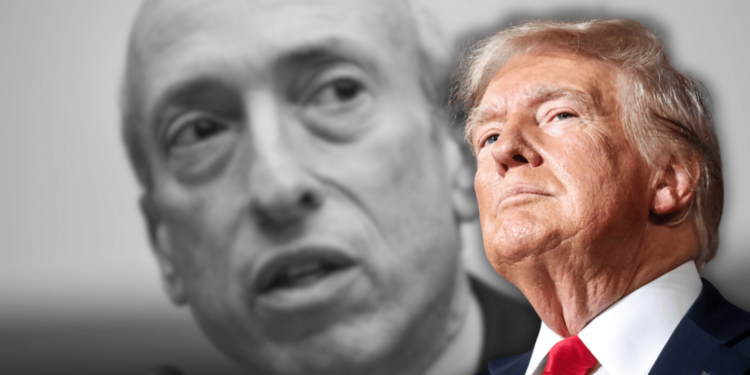- Republican SEC officials plan to review crypto regulations and pause some enforcement actions under the new administration.
- Trump’s incoming SEC Chair, Paul Atkins, is expected to reverse Gary Gensler’s strict crypto policies.
- Bitcoin soared past $100,000 in December amid optimism for Trump’s crypto-friendly leadership.
Top Republican officials at the U.S. Securities and Exchange Commission (SEC) are gearing up for a potential shift in cryptocurrency policies as Donald Trump prepares to take office. Insiders say changes could start as soon as next week, led by commissioners Hester Peirce and Mark Uyeda, both of whom favor a more crypto-friendly approach.
Crypto Policy Shake-Up
Peirce and Uyeda are reportedly preparing to introduce new guidance or rules clarifying when cryptocurrencies qualify as securities. They may also review pending crypto enforcement cases, potentially pausing litigation that doesn’t involve outright fraud. This marks a stark contrast to outgoing SEC Chair Gary Gensler’s strict stance on the industry, which included 83 crypto-related enforcement actions during his tenure.
Trump’s pick for SEC Chair, Paul Atkins, is expected to fully reverse Gensler’s crackdown, though his Senate confirmation timeline remains unclear. In the meantime, Peirce and Uyeda, who both worked under Atkins in the past, are set to take the lead. The two have been outspoken critics of the previous administration’s tough policies, advocating instead for clearer, more accommodating crypto regulations.
Reassessing Enforcement and Regulations
Under Gensler, the SEC maintained that many cryptocurrencies behave like securities, requiring companies like Coinbase and Kraken to comply with SEC rules—claims often disputed by industry players. Critics argue the SEC should define when tokens qualify as securities, and Peirce and Uyeda are expected to prioritize early-stage rulemaking to address these concerns. A call for public and industry feedback is likely to kick off this process.
The new administration may also overturn prior accounting rules that made it costly for public companies to hold crypto assets for clients. Additionally, Trump is expected to issue executive orders urging federal regulators to review and reform their crypto policies, further cementing his position as a “crypto president.”
Challenges Ahead
Despite optimism within the crypto industry, the road to regulatory clarity is fraught with obstacles. Reopening settled cases or dismissing enforcement actions could trigger legal and political backlash, with some experts warning that such moves might politicize the SEC’s enforcement process.
While Peirce and Uyeda may seek to freeze certain cases, tackling fraud remains a priority. “The industry still wants fraudsters held accountable,” said Robert Cohen, a former SEC enforcement attorney. Resolving these tensions could take months, if not longer, leaving the future of U.S. crypto regulations hanging in the balance.
Market and Industry Response
The anticipation of a crypto-friendly administration has already sent shockwaves through the market. Bitcoin surged past $100,000 for the first time in December, driven by enthusiasm over Trump’s pro-crypto campaign promises. Industry leaders are optimistic that the shift in leadership will create a more favorable regulatory environment for cryptocurrencies, but the extent of the change remains to be seen.














